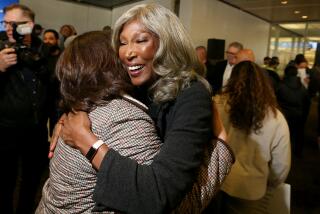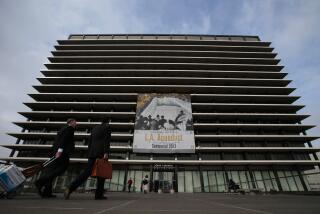The Atmosphere Is Electric at 7th Annual Linemen’s Rodeo
- Share via
SYLMAR — Doug Kleinberg walked straight up into the sky, the metal “hooks” on his boots digging into the wood pole. Then, a raw egg cradled in his mouth, he made his way down, scurrying like a squirrel with a nut.
“To think they do this in their daily work,” said his grandmother, Victoria Ward, referring to the pole-climbing, minus the egg. “They risk their lives all the time.”
For Ward and the several hundred other spectators, the seventh annual Linemen’s Rodeo on Saturday was an opportunity to see the men at work. As the T-shirt for this year’s event read, “5,000 volts in your hand. 60 feet in the air. No net. No excuses. Just another day at the office.”
“This job combines the two things people fear the most: electricity and height,” said Graham Peace, one of the rodeo organizers.
Thirty-five teams from seven area power and water providers battled it out on the training grounds in Sylmar, with the top four to advance to the national championships in Kansas City this September.
Victory, however, wasn’t the only mission. The event offered the workers a chance to show off a bit--despite rules forbidding both “hot dogging” and, in the case of the egg competition, “removing false teeth.”
At the “Hurtman Rescue,” Glenn Harrison watched a colleague from the Burbank Public Service Department lower the injured man--a dummy outfitted in bright orange jumpsuit and a hard hat--to the ground. Harrison, who like many of the men at the rodeo sported a long, drooping mustache, only recently began an apprenticeship as a lineman. He said working on the lines is a job people seldom think about unless their power goes out.
“Most people have no idea of what the work consists of,” Harrison said with a shrug. “Firemen get all the glory.”
*
At the rodeo, where pickup trucks outnumbered cars by about 3 to 1, the cowboy spirit was alive and well. But the job itself has a focus on teamwork, contestants said, not individuality.
“When you’re working, you rely on each other. You have to have confidence in the people you work with,” said Harrison. “Your life could be in his hands, and his in yours.”
Although not politically correct, the term “lineman” is hardly a misnomer. The profession is still overwhelmingly male, said contestants. It is also one of the most dangerous jobs in the United States, ranking as one of the four most hazardous careers, according to the DWP.
Even at the games, where the wires carried no electric current, the emphasis on safety was evident. In the “Crossarm Change” event, where contestants race to see who can replace the bar holding the wires the fastest while making no errors, the electrical lines were covered with protective shields. The men worked together, two aloft and one on the ground, to make the change, performing a well-choreographed maintenance dance.
Marco Jimenez, an LAPD officer, came to the rodeo for a better understanding of his brother-in-law’s job.
“They couldn’t pay me a million dollars to do what these guys do,” said Jimenez.
For his brother-in-law, James Delacy, who is halfway through his four-year lineman training program at the Los Angeles Department of Water and Power, the job is now in his blood.
Delacy’s son Timmy, 7, watching the men high above, said he would one day seek a different career.
“Too dangerous,” he said shaking his head. “It’s cool, but I don’t want to do it.”
When the results were tallied, the DWP--which sponsored the event along with a local lineman’s union--was the big winner, capturing three of the four slots for the national competition. A team from Southern California Edison captured the final spot.
For Ward, watching her grandson was good fun, but her vantage point left much to be desired.
“If I don’t quit looking up,” said the Northridge resident. “I’m going to have a stiff neck.”
More to Read
Go beyond the scoreboard
Get the latest on L.A.'s teams in the daily Sports Report newsletter.
You may occasionally receive promotional content from the Los Angeles Times.











